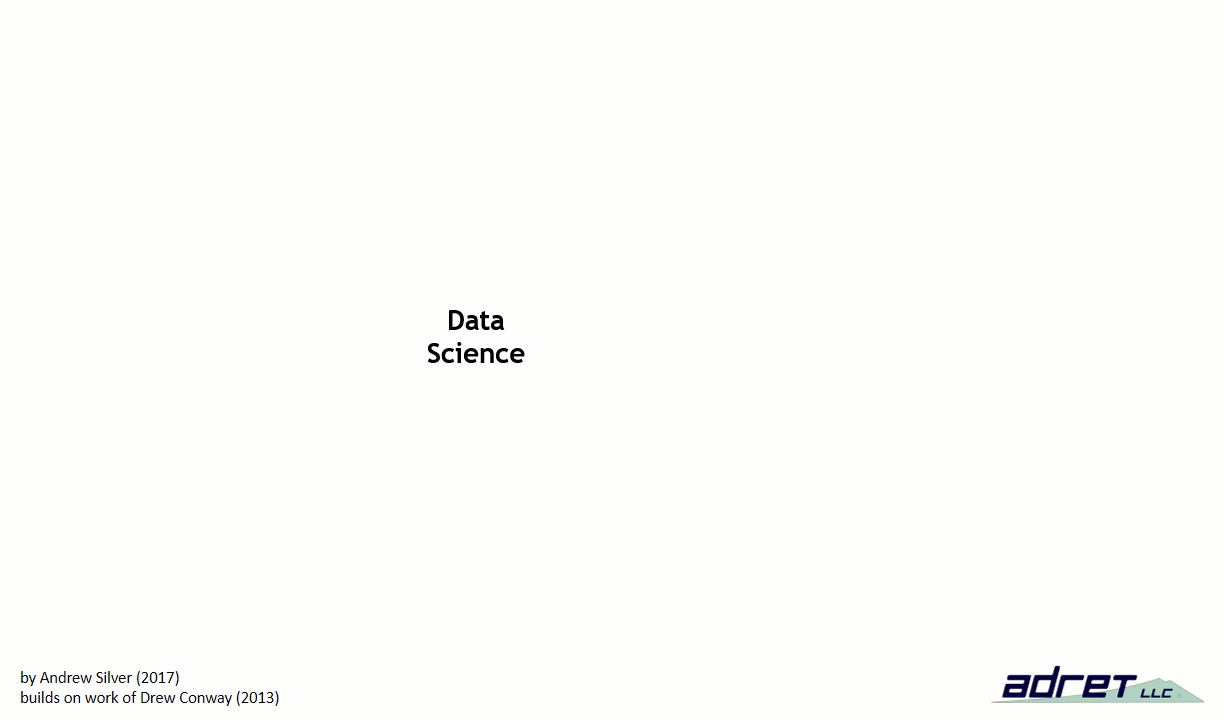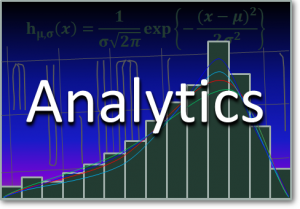
**NOTE: New client work is being accepted on a limited basis and only when orthogonal to current commitments.**
Statistics is essentially the application of science to data. Hence, applied multivariate statistics is often referred to as “Data Science.” In most cases, “Analytics” or “Advanced Analytics” are analogous terms. There is a good chance that you have heard these and other terms such as “Business Intelligence,” “Big Data,” “Machine Learning,” “Neural Networks,” and “Deep Learning” being used with increasing frequency in the last few years.
While the advent of automated machine learning applications have made highly sophisticated algorithms readily implementable by anyone regardless of their level of statistical acumen, the following facts remain highly relevant to all analytics practitioners:
 Substantial pitfalls in assessing statistical validity exist which are situation-based, requiring the contextual understanding of domain experts and a core understanding of multivariate statistics.
Substantial pitfalls in assessing statistical validity exist which are situation-based, requiring the contextual understanding of domain experts and a core understanding of multivariate statistics.- Feature engineering — best done with input from domain experts — is often more important to improving multivariate analyses than are algorithm selections and hyperparameter tunings.
While Adret LLC is happy to assist you with your analytics implementations, we also strongly believe in training clients so as to address the critical need to cross-pollinate statistical expertise and domain knowledge. To this end, we offer a number of training options* in addition to our consulting services:
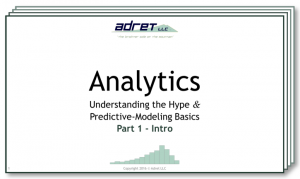 A 1-hour talk on assessing statistical validity (perfect for lunch-and-learn events)
A 1-hour talk on assessing statistical validity (perfect for lunch-and-learn events)- A 1-day short course on multivariate analytics
- A 2-day short course on multivariate analytics which includes hands-on coding and model assessment examples
The short courses are designed to help audiences gain an appreciation for the power, applicability, and pitfalls of multivariate computational statistics. They consists of five modules:
- Part 1 – Intro: provides a high-level, holistic overview of the material in subsequent modules
- Part 2 – Data Wrangling: reviews data types, data preparation, and considerations necessary for building databases
- Part 3 – Diagnostics: overviews data and model diagnostic techniques necessary for building valid multivariate models
- Part 4 – Descriptive Analytics: introduces multivariate methods such as component analysis, clustering, latent variable models, and discriminant analysis
- Part 5 – Predictive Analytics: compares predictive modeling options such as multivariate regression, decision trees, random forests, and neural networks
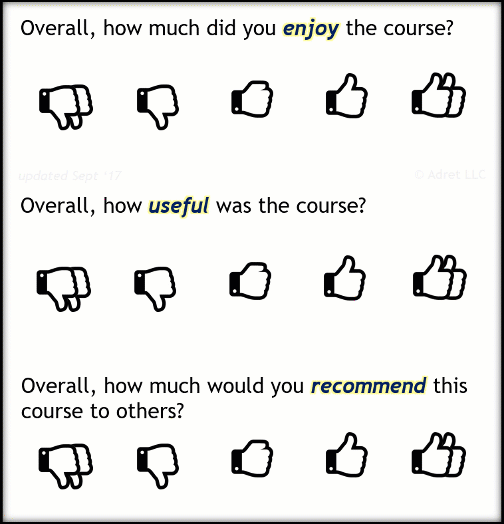 The course has already been given at a few publicly-traded upstream O&G companies. Feedback from the short-course attendees regarding the course’s enjoyability, usefulness, and whether they would recommend it to others has been very positive and is summarized in the adjacent graphic.
The course has already been given at a few publicly-traded upstream O&G companies. Feedback from the short-course attendees regarding the course’s enjoyability, usefulness, and whether they would recommend it to others has been very positive and is summarized in the adjacent graphic.
A flier for the course can be found here. Contact us for a quote if you are interested in hosting an in-house presentation of the talks at your organization. Collectively, the modules are designed to help managerial and technical staff appreciate how multivariate analytics might benefit their operations.
Testimonials:
- “Great communication – Great displays” – Manager, Exploration Technology
- “[The instructor was] very passionate about this subject which made the class enjoyable.” – Geologist
- “Enjoyed the combination of statistics, O&G experience, and culture.” – Engineering Adviser
- “The material & explanations were thorough without being cumbersome.” – Geologist
- “Awesome talk! Particularly the 3rd & 4th parts were very helpful and relevant to the industry.” – Geophysicist
- “[He] knew the material thoroughly, … was never stumped by a question and offered valuable insights” – Data Architect
- “Great presentation and statistics overview.” – Senior Geologist
Multivariate techniques can provide tremendous insights whether dealing with small, business-critical projects or big data sets. Regardless of the size of your data, multivariate analytics can help you cut through the clutter.
Do you wonder whether multivariate analytics can help address your business needs? Is it possible that your feature engineering might be improved? Let’s talk.
Have a mountain of data?
Let’s find the bright side of it!
 Adret LLC’s founder Andrew Silver earned an M.S. Analytics from Texas A&M University’s Department of Statistics and also has an M.S. Earth Science from Rice University. His analytics capstone project extracted metrics from millions of rows of data from thousands of wells in the South Texas Eagle Ford trend; incorporated multidisciplinary sources; and culminated in a valid, parsimonious multivariate model. The model was then used to assess the financial impact of various geologic indicators, drilling practices, completion styles, and production methods.
Adret LLC’s founder Andrew Silver earned an M.S. Analytics from Texas A&M University’s Department of Statistics and also has an M.S. Earth Science from Rice University. His analytics capstone project extracted metrics from millions of rows of data from thousands of wells in the South Texas Eagle Ford trend; incorporated multidisciplinary sources; and culminated in a valid, parsimonious multivariate model. The model was then used to assess the financial impact of various geologic indicators, drilling practices, completion styles, and production methods.
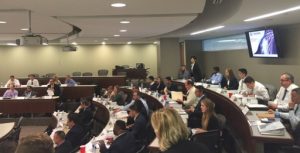
The TAMU MS Analytics is provided through a partnership between the TAMU Department of Statistics and the Mays Business School. The resulting program focuses on providing a diverse statistical toolkit which can be applied broadly to find valid solutions to strategic business problems. Informed by this approach, Adret’s training and analytics services have a central focus on assessing validity and providing value.
“… In practice, multivariate data sets are common, although they are not always analyzed as such. But the exclusive use of univariate procedures with such data is no longer excusable given the availability of multivariate techniques and inexpensive computing power to carry them out.”
-Rencher & Christensen (2012), Methods of Multivariate Analysis, 3rd Ed.
* Lecture costs will vary depending on location (i.e., travel costs), availability, and audience size. In some cases, the first lecture (Part 1) may be offered at a reduced cost or free of charge. For the 1-day course, rates start at $300/person with a minimum of 10 attendees. Discounts available for larger groups. A flier for the course is avaiable here. If interested, please contact us for a quote.
We love our community and country. Government agencies may be eligible for free or substantially discounted access to our lectures.
Adret LLC retains the right of refusal as necessary to secure its intellectual capital.
Disclaimer: Lecture presentations are designed to increase awareness of the capabilities of and “best practices” within data science but do not, of themselves, qualify audiences to practice data science. The lectures also help familiarize audiences with the terminology of data science (“buzzword compliance”), better enabling them to communicate their business needs with statisticians/data scientists.
The aid of competent [statisticians/data scientists] should be sought out for analytics implementations. Individuals interested in becoming bonafide data scientists themselves (i.e., who want to torture themselves with multivariate statistics and programming curricula) are encouraged to seek entry into graduate-level educational programs specializing in multivariate statistics.


